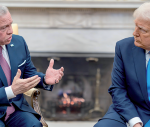You are here
On the path to authoritarianism
Jun 05,2018 - Last updated at Jun 05,2018
When Donald Trump was elected, I, like many others, feared what his presidency might do to the country. A year and a half into his term in office, our concerns have been justified.
He and his team are dismantling health care reform, erasing needed environmental protections, casting aside international treaties and agreements, exacerbating income inequality and putting vulnerable communities at risk.
What I find as troubling as these policies, however, is the profound damage he has done to civil discourse and our political culture, and the danger he poses to our democracy. There are warning signs that he is taking us down the path to authoritarian rule from which it will be difficult to recover.
What are those signs? An aggrieved and angry constituency, and a charismatic leader who is able to prey on their discontent by creating a breakdown of trust in democratic institutions and a fraying of social cohesion. These are the guideposts on the path to authoritarianism and they describe the trajectory of the Trump presidency.
A new president and Congress can undo some of Trump's destructive policies as quickly as they were implemented. But the damage inflicted on our culture and institutions will take generations to repair.
There was a time when I would caution folks not to pay attention to Trump's Tweets or to listen to his nightclub-style stand-up comedy routines. They were, I would argue, distractions. He was making outrageous and obviously false statements only to take press attention away from the destructive policies he was pursuing. In this, I was only partially right. He was, to be sure, engaging in classic misdirection. But, as we have come to see, the Tweets and rally speeches carry their own poison.
As a case in point, in just the past week, Trump has launched a number of "Twitter rants" in which he repeatedly attacked a variety of "enemies". There were 75 Tweets, in all, with one-half of them targeting his foes: the media, the Department of Justice (DoJ), the FBI, the courts, Democrats, and, of course, Hillary Clinton.
There were ten Tweets accusing the FBI of planting a "highly paid spy" in his campaign, calling the law enforcement agency "corrupt" and "dishonest", 18 Tweets denouncing the "fake witch hunt" against him, another 10 attacking the media as "corrupt", "dishonest", having a "double standard" and finally another dozen mentions of Democrats, whom he also accused of having a hand in planting a "highly paid" spy to infiltrate his campaign (which he termed #Spygate) and coddling MS-13 killers. In the end, he says those who were guilty of collusion were the DoJ, the FBI, the Democrats and Russia.
While all of this might be described as political gamesmanship or dismissed as the idle ranting or mere frustrated and disgruntled chatter, it is in fact quite dangerous. Trump is, after all, the president and millions read his Tweets. They are given an even larger audience when repeated by the well-established right-wing echo chamber of Fox News and a host of websites and talk radio programmes. All of this has enabled him to spin a narrative of distrust and discontent that has taken hold among his aggrieved supporters.
Central to his narrative is an intensely divisive "us versus them" mindset, a complete disregard of civility and a dangerous erosion of confidence in some of the basic institutions of our society. In an especially revealing interview a few months ago, Trump explained to the interviewer that the reason he focused on discrediting and demeaning the media and other institutions was so that when they came after him, his supporters would be inclined to disbelieve what was being reported. And this is what has come to pass.
Not only has Trump used his Tweets and speeches to foster mistrust of the courts, the DoJ and FBI, he has also preyed on his supporters' social, political, economic and cultural discontent by targeting for blame a number of minority racial and ethnic communities. This has contributed to fueling xenophobia and racism, legitimating displays of unconscionable bigotry.
One example of the impact of this world to which Trump has given birth was on display this week, when a Trump-supporter, TV star Roseanne Barr launched an offensive and racist Twitter rant late one night. In one particularly egregious Tweet, she described former US president Barack Obama aide Valerie Jarrett as being the offspring of the "Muslim Brotherhood and the Planet of the Apes". The ABC television network, that carried her show, promptly responded by denouncing her comments and cancelling her contract.
Barr quickly apologised in a Tweet, but her supporters flooded her Twitter account with protests supporting her and amplifying her racism. At first, Barr pleaded with them to stop defending her, saying that her Tweet was wrong and inexcusable. Then, true to form, Barr shifted gears assuming the role of the victim of unfair elites.
Since Barr is known to be a supporter of Trump, and he is a supporter of hers, all eyes were on the president to see how he would respond. Here's what he wrote:
"Bob Iger of ABC called Valerie Jarrett to let her know that 'ABC does not tolerate comments like those' made by Roseanne Barr. Gee, he never called President Donald J. Trump to apologise for the HORRIBLE statements made about me on ABC. Maybe I just did not get the call."
The net effect of Trump's Tweet was to dismiss the uproar over Barr's racism, to turn the tables by accusing the network of a double standard, and to validate his, and Barr's, supporters sense of being victims of a hostile media.
It took America two generations to put the lid on the type of overt displays of racism Barr exhibited in her Tweet. To be sure, racism did not go away but people learned to be ashamed enough not to be public about it. In just a few years, Trump has blown the lid away giving comfort to bigots of all stripes. He has used this and his other rhetoric to build his movement of discontent, all the while discrediting his opponents whether they be from the "other party", law enforcement or the media. This is how democracies are wounded and the path to authoritarianism is paved. There is danger ahead.
The writer is president of the Washington-based Arab American Institute













